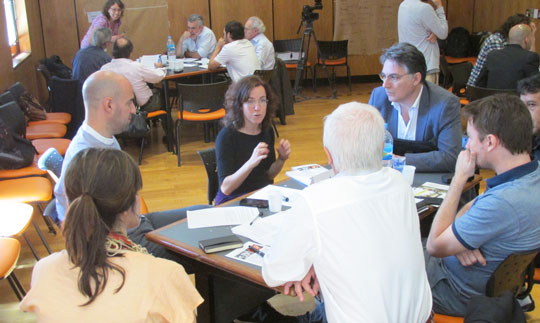by Patrick van Zwanenberg, Anabel Marin & Adrian Ely
With the new Sustainable Development Goals adopted by the UN last year, SciDev.Net has published a timely report on the global status of sustainability science.
Sustainability science (defined as ‘research that supports and drives sustainable development’) is growing significantly as a proportion of world scientific output, and is highly collaborative, as the report shows. But it is still – with the important exception of China – an endeavour dominated by rich countries.
High income countries produce three quarters of all research output on sustainability. Low-income countries account for only 2% of publications. Although the field is highly collaborative, most of that collaboration occurs between researchers based in high-income countries. Middle and especially low-income countries are far less involved, and there are very few South-South links.
The report found that, where developing country researchers are involved in collaborating with their colleagues in rich countries, those partnerships are hugely important, contributing a large proportion of developing countries research output on sustainability.
But as Luisa Massarani from SciDev.Net notes, a critical question the report raises – but does not address – is this: how much of this North-South collaborative work has followed the agendas and priorities of poor countries?
Bucking the trend
The minor role played by low and middle income countries in producing global sustainability research – and their even more limited opportunities to set research agendas and priorities – are almost certainly characteristic of all areas of science, technology and innovation.
But sustainability challenges, and future pathways, are highly dependent on context. They are also deeply contested. This makes the Northern bias of research agendas especially unfortunate.
Research from the South
Now, a new ‘Transformations to Sustainability Programme’ set up by the International Social Science Council – and a STEPS consortium project on ‘Transformative Pathways to Sustainability’ funded by it – is countering that undesirable trend.
ISSC’s ‘Transformations to Sustainability Programme’ aims to support research networks and activities that enable transformations to more sustainable and socially just societies. The programme, which called for multi-continent, multi-country research teams, required lead or co-lead applicants to be based in a low or middle-income country. It is also supporting a new way of doing research, one that is co-designed and co-produced, which means that all stakeholders and users are involved in a meaningful way in the research production process, including, crucially, the setting of priorities and framing of research questions.
Our project is co-led from Argentina, with STEPS partners from both low and middle income countries (Kenya, India, and China) and high income nations – Sweden, the USA and the UK. With initial seed funding, we ran workshops defining sustainability challenges and priorities with stakeholders in each country in the fields of urban water and waste in cities, low carbon energy transitions, and sustainable agricultural and food systems.

Workshop in Argentina on sustainable seed systems. Photo: STEPS America Latina
Methods and learning across borders
Our aim now will be to experiment with new methodological and institutional approaches to building pathways to sustainability across those different sectors, regions and cultures. We will be drawing on these experiments to aid mutual learning across settings. For example, researchers will carry out collaborative writing tasks, and we will run exchanges of early career researchers between our project regions.
We will also focus strongly on capacity building: through the STEPS Summer School, online resources that are under development, and the early career researcher exchanges, with support from more senior colleagues across high, low and middle-income countries.
Cosmas Ochieng, Executive Director of the African Centre for Technology Studies (another partner on the project who are focussing on low carbon transitions that serve the needs of the poor) said: “This is a truly exciting North-South, South-South, interdisciplinary and transformative collaborative research project and we look forward to cross-sectoral and cross-regional learning and exchange of knowledge and experiences on low carbon development pathways within the consortium”.
The ISSC project provides an amazing opportunity to develop the STEPS consortium’s ambitions for further South-South collaboration and to co-produce research on sustainability challenges that are defined by those most familiar with the contexts in question.
Comments are closed.